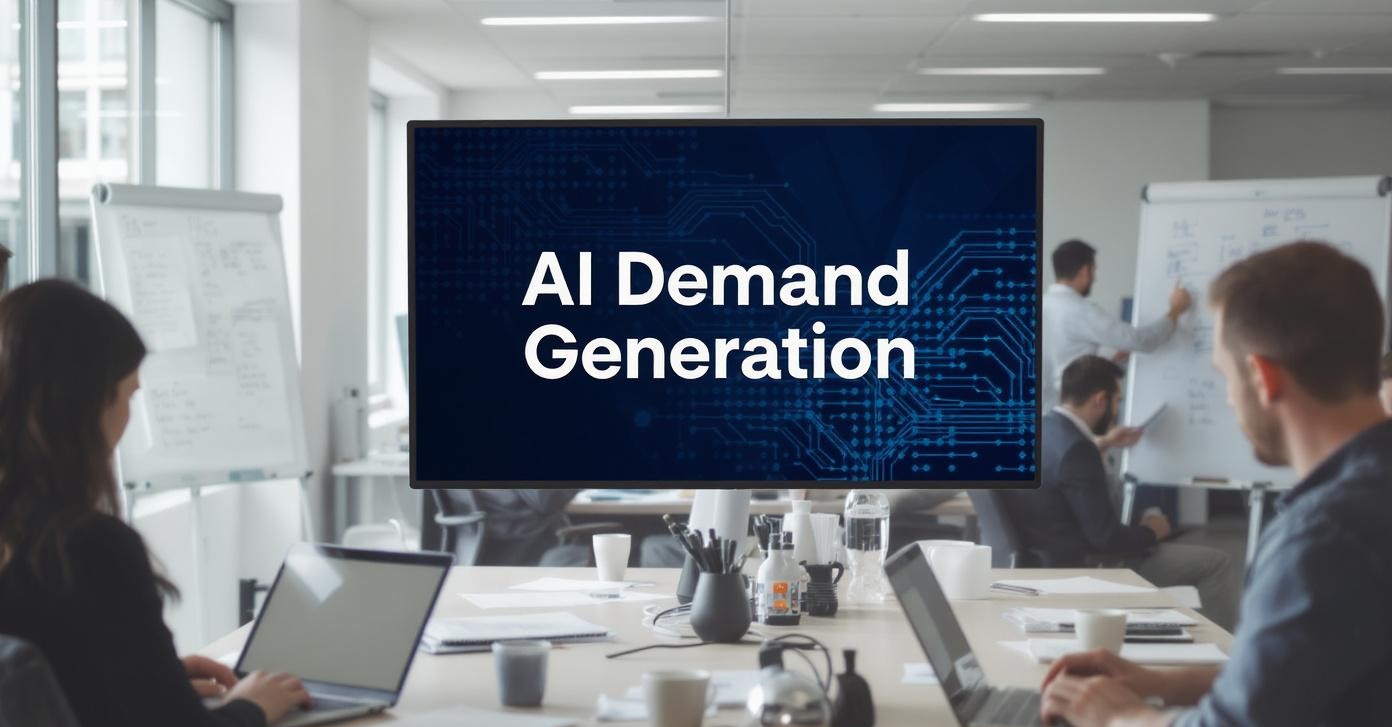The world of B2B marketing is being reshaped by artificial intelligence and automation, creating new opportunities for demand generation. By 2025, businesses that adopt the best AI-driven demand generation methods will achieve higher engagement, better targeting, and more predictable results. AI and automation are allowing marketers to use data strategically, optimize campaigns in real time, and provide personalized experiences that convert at scale.
Traditional demand generation relied on manual segmentation, generic content, and reactive marketing. AI and automation are replacing these practices with predictive, adaptive, and scalable solutions. Companies can now anticipate buyer needs, dynamically optimize campaigns, and streamline the lead nurturing process to ensure that every engagement contributes to measurable ROI.
Predictive Marketing Intelligence
AI enables marketers to forecast customer behavior and identify prospects with the highest likelihood to convert. Predictive analytics platforms analyze large datasets, detecting subtle engagement signals that indicate intent. By leveraging these insights, marketers can launch campaigns that meet buyers at the most relevant points in their journey.
In 2025, predictive models will continuously refine segmentation based on interactions, content preferences, and historical behavior. This approach ensures marketing resources are focused on qualified leads, reducing waste and maximizing return on investment. Businesses implementing AI-powered predictive strategies can gain a competitive advantage in a crowded marketplace.
Automation Enhancing Efficiency
Automation supports AI by streamlining repetitive tasks and ensuring precise execution of campaigns. Email sequences, lead nurturing workflows, and personalized messaging can all be handled automatically, while maintaining high levels of relevance for each prospect.
By 2025, automation will integrate seamlessly with CRM, analytics, and content management systems, creating a connected ecosystem. This integration allows marketers to monitor performance, adjust strategies on the fly, and scale campaigns efficiently. Automation ensures consistency across all touchpoints, enabling teams to focus on creative and strategic initiatives.
AI-Powered Content Personalization
Personalized content drives engagement, and AI is taking this to the next level. Machine learning and natural language processing tools analyze user behavior to deliver adaptive website experiences, recommend relevant resources, and craft tailored ad copy.
For instance, a lead interacting with a case study on marketing automation may receive follow-up content exploring predictive analytics or lead scoring best practices. This adaptive approach nurtures prospects through a personalized journey, increasing the likelihood of conversion.
Companies adopting the best AI-driven demand generation methods will see content marketing evolve into a continuous optimization system, learning from every engagement to improve future campaigns.
Real-Time Analytics and Decision Making
AI analytics platforms allow marketers to process data in real time and gain actionable insights immediately. This capability enables teams to identify trends, optimize campaigns, and make informed decisions faster than ever before.
In 2025, predictive analytics will not only track performance but also forecast future engagement. Marketing teams can allocate budgets to high-performing channels, fine-tune messaging, and adapt campaigns proactively, increasing efficiency and ROI. AI frees teams from manual reporting, allowing marketers to focus on strategy and innovation.
Conversational AI and Chatbots
Chatbots powered by AI are revolutionizing lead engagement by providing instant, personalized responses. These systems can qualify leads, answer inquiries, and guide prospects through the sales journey around the clock.
By 2025, conversational AI will understand intent, sentiment, and context, enabling meaningful interactions that accelerate decision-making. When integrated with automation platforms, chatbots can trigger follow-up campaigns, schedule meetings, and transfer qualified leads to sales teams, ensuring a seamless experience for potential buyers.
Account-Based Marketing Powered by AI
AI enhances Account-Based Marketing (ABM) by identifying high-value accounts and optimizing campaigns for specific decision-makers. By analyzing engagement patterns, firmographic data, and intent signals, marketers can deliver highly relevant and timely messages.
Automation ensures that each interaction is customized and consistent, increasing engagement and conversion rates. Organizations using the best AI-driven demand generation methods for ABM will shorten sales cycles and strengthen relationships with key accounts.
Intelligent Lead Scoring and Qualification
AI transforms lead scoring by evaluating behavioral, demographic, and engagement data to generate accurate, dynamic scores. This allows sales teams to focus on prospects most likely to convert, improving efficiency and effectiveness.
Automation complements AI by triggering targeted nurturing workflows for leads that meet specific criteria, ensuring timely follow-ups and higher conversion rates. Businesses implementing intelligent lead scoring gain a measurable advantage in revenue generation.
Integration Across Marketing and Sales Platforms
AI acts as a central intelligence layer, connecting CRM, marketing automation, and analytics platforms. Every interaction, from website visits to email clicks, feeds into a unified system, providing a comprehensive view of buyer behavior.
This integration allows marketers to deliver consistent, personalized campaigns across multiple channels while measuring performance accurately. AI-driven insights help teams optimize campaigns and make informed decisions faster than traditional methods.
Ethical AI and Responsible Automation
As AI and automation become central to demand generation, ethical considerations are essential. Companies must prioritize transparency, data privacy, and algorithmic fairness to build trust with customers.
By 2025, organizations will adopt responsible AI practices and ensure compliance with global privacy regulations. Using the best AI-driven demand generation methods responsibly will allow businesses to deliver powerful marketing campaigns while maintaining customer trust and brand reputation.
AI as a Catalyst for Growth
The combination of AI and automation is transforming demand generation into a growth engine. Companies that leverage these technologies can deliver predictive, personalized, and measurable marketing programs that outperform competitors.
Integrating the best AI-driven demand generation methods into every stage of marketing, from lead acquisition to post-sale engagement, allows businesses to merge data-driven precision with creative strategy. This approach will redefine how organizations attract, nurture, and convert leads in 2025, enabling sustainable growth and long-term success.
Read Full Article : https://acceligize.com/featured-blogs/how-ai-and-automation-will-transform-demand-generation-in-2025/
About Us : Acceligize is a global B2B demand generation and technology marketing company helping brands connect with qualified audiences through data-driven strategies. Founded in 2016, it delivers end-to-end lead generation, content syndication, and account-based marketing solutions powered by technology, creativity, and compliance.

